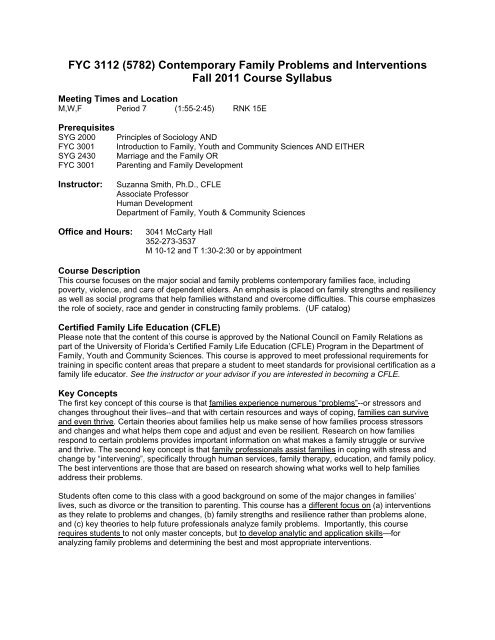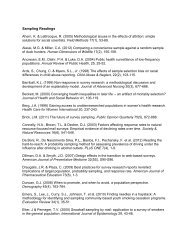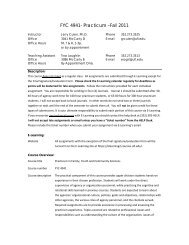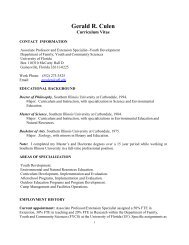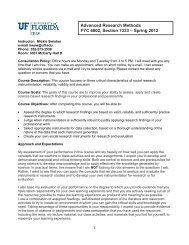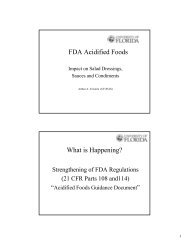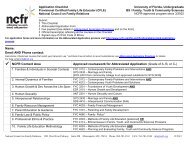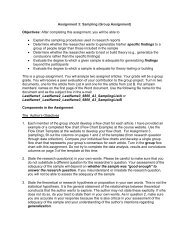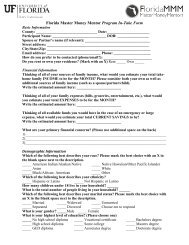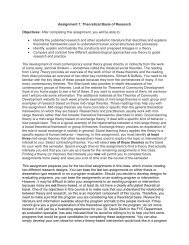FYC 3112 - University of Florida Family Youth and Community ...
FYC 3112 - University of Florida Family Youth and Community ...
FYC 3112 - University of Florida Family Youth and Community ...
Create successful ePaper yourself
Turn your PDF publications into a flip-book with our unique Google optimized e-Paper software.
<strong>FYC</strong> <strong>3112</strong> (5782) Contemporary <strong>Family</strong> Problems <strong>and</strong> Interventions<br />
Fall 2011 Course Syllabus<br />
Meeting Times <strong>and</strong> Location<br />
M,W,F Period 7 (1:55-2:45) RNK 15E<br />
Prerequisites<br />
SYG 2000 Principles <strong>of</strong> Sociology AND<br />
<strong>FYC</strong> 3001 Introduction to <strong>Family</strong>, <strong>Youth</strong> <strong>and</strong> <strong>Community</strong> Sciences AND EITHER<br />
SYG 2430 Marriage <strong>and</strong> the <strong>Family</strong> OR<br />
<strong>FYC</strong> 3001 Parenting <strong>and</strong> <strong>Family</strong> Development<br />
Instructor:<br />
Suzanna Smith, Ph.D., CFLE<br />
Associate Pr<strong>of</strong>essor<br />
Human Development<br />
Department <strong>of</strong> <strong>Family</strong>, <strong>Youth</strong> & <strong>Community</strong> Sciences<br />
Office <strong>and</strong> Hours:<br />
3041 McCarty Hall<br />
352-273-3537<br />
M 10-12 <strong>and</strong> T 1:30-2:30 or by appointment<br />
Course Description<br />
This course focuses on the major social <strong>and</strong> family problems contemporary families face, including<br />
poverty, violence, <strong>and</strong> care <strong>of</strong> dependent elders. An emphasis is placed on family strengths <strong>and</strong> resiliency<br />
as well as social programs that help families withst<strong>and</strong> <strong>and</strong> overcome difficulties. This course emphasizes<br />
the role <strong>of</strong> society, race <strong>and</strong> gender in constructing family problems. (UF catalog)<br />
Certified <strong>Family</strong> Life Education (CFLE)<br />
Please note that the content <strong>of</strong> this course is approved by the National Council on <strong>Family</strong> Relations as<br />
part <strong>of</strong> the <strong>University</strong> <strong>of</strong> <strong>Florida</strong>’s Certified <strong>Family</strong> Life Education (CFLE) Program in the Department <strong>of</strong><br />
<strong>Family</strong>, <strong>Youth</strong> <strong>and</strong> <strong>Community</strong> Sciences. This course is approved to meet pr<strong>of</strong>essional requirements for<br />
training in specific content areas that prepare a student to meet st<strong>and</strong>ards for provisional certification as a<br />
family life educator. See the instructor or your advisor if you are interested in becoming a CFLE.<br />
Key Concepts<br />
The first key concept <strong>of</strong> this course is that families experience numerous “problems”--or stressors <strong>and</strong><br />
changes throughout their lives--<strong>and</strong> that with certain resources <strong>and</strong> ways <strong>of</strong> coping, families can survive<br />
<strong>and</strong> even thrive. Certain theories about families help us make sense <strong>of</strong> how families process stressors<br />
<strong>and</strong> changes <strong>and</strong> what helps them cope <strong>and</strong> adjust <strong>and</strong> even be resilient. Research on how families<br />
respond to certain problems provides important information on what makes a family struggle or survive<br />
<strong>and</strong> thrive. The second key concept is that family pr<strong>of</strong>essionals assist families in coping with stress <strong>and</strong><br />
change by “intervening”, specifically through human services, family therapy, education, <strong>and</strong> family policy.<br />
The best interventions are those that are based on research showing what works well to help families<br />
address their problems.<br />
Students <strong>of</strong>ten come to this class with a good background on some <strong>of</strong> the major changes in families’<br />
lives, such as divorce or the transition to parenting. This course has a different focus on (a) interventions<br />
as they relate to problems <strong>and</strong> changes, (b) family strengths <strong>and</strong> resilience rather than problems alone,<br />
<strong>and</strong> (c) key theories to help future pr<strong>of</strong>essionals analyze family problems. Importantly, this course<br />
requires students to not only master concepts, but to develop analytic <strong>and</strong> application skills—for<br />
analyzing family problems <strong>and</strong> determining the best <strong>and</strong> most appropriate interventions.
To accomplish this analytic <strong>and</strong> applied thinking, you will first need to:<br />
• Thoroughly underst<strong>and</strong> the theories presented in the first part <strong>of</strong> the course <strong>and</strong> utilize the<br />
theories, particularly the Double ABCX theory, to analyze all the problems covered in the course.<br />
• Master the concepts <strong>of</strong> each <strong>of</strong> the four interventions <strong>and</strong> use each appropriately to intervene with<br />
a hypothetical family.<br />
When you accomplish this, you will be taking the first steps in the basic work <strong>of</strong> a family pr<strong>of</strong>essional.<br />
Whether you intend to work with families, youth, or some other population, these skills for<br />
conceptualization, analysis, integration, <strong>and</strong> application will help you identify <strong>and</strong> solve problems. The<br />
course is structured to help you practice these skills in <strong>and</strong> out <strong>of</strong> class.<br />
Main Course Goals<br />
1. Provide objective information on the difficult problems US families face based on recent research.<br />
2. Use theories to frame up how families react to <strong>and</strong> cope with these issues.<br />
3. Introduce key ways <strong>of</strong> intervening with families to prevent problems or provide needed<br />
assistance.<br />
4. Provide opportunities to think critically about family changes, challenges, <strong>and</strong> interventions.<br />
5. Provide opportunities to practice analysis <strong>and</strong> applications <strong>of</strong> learning to case studies<br />
representing “real life” situations.<br />
Course Objectives<br />
Students who successfully complete this course will be able to:<br />
1. Identify the major changes <strong>and</strong> challenges in modern family life.<br />
2. Use theories <strong>of</strong> systems, development, stress <strong>and</strong> coping, <strong>and</strong> family resilience to explain how<br />
families respond <strong>and</strong> deal with challenges.<br />
3. Identify pr<strong>of</strong>essional interventions.<br />
4. Analyze a case study, applying knowledge <strong>of</strong> family problems, theory, <strong>and</strong> interventions to best<br />
assist the family.<br />
Course Format<br />
To accomplish the course goals <strong>and</strong> objectives, this course will include: (a) introduction to concepts via<br />
mini-lecture <strong>and</strong> question <strong>and</strong> answer with the large group; (b) group discussions, videos, written<br />
assignments, <strong>and</strong> other activities to help us analyze family problems <strong>and</strong> determine the interventions that<br />
will help them.<br />
Required Readings <strong>and</strong> Other Material<br />
Text:<br />
You must bring your book (or the chapter for the day) to class every day unless otherwise<br />
announced.<br />
Price, S. J., Price, C. A., & McKenry, P. C. (Eds.). (2010). Families <strong>and</strong> change (4 th Ed.).<br />
Thous<strong>and</strong> Oaks, CA: Sage.<br />
When a chapter is assigned for a week, students are expected to have read the material by<br />
Monday. Otherwise, the specific day for a reading will be listed. A copy <strong>of</strong> the text will be on<br />
reserve in the Marston Science Library.<br />
Other Readings:<br />
Other readings can be accessed on the Internet, library e-reserve (ARES), or course e-learning<br />
site, as indicated in the course calendar <strong>and</strong>/or announced in class.<br />
E-Learning on Sakai:<br />
Check daily for announcements, assignments, <strong>and</strong> h<strong>and</strong>outs. I will do my best to have lecture<br />
notes posted in advance so you can print these out <strong>and</strong> bring them to class, unless a class<br />
activity is needed before viewing lecture notes. Laptop/netbook computers are not permitted in<br />
class.<br />
Videos:<br />
Several videos are assigned throughout the semester. These are not purely for entertainment<br />
(although some are entertaining!); they are an integral part <strong>of</strong> the course material, <strong>and</strong> you will be<br />
asked to analyze these examples for course concepts <strong>and</strong> applications. Typically there will be a
viewing guide to help you identify key concepts <strong>and</strong> analyze key parts <strong>of</strong> the video; these viewing<br />
guides may be collected at the end <strong>of</strong> class as an activity grade.<br />
Email <strong>and</strong> <strong>of</strong>fice hours:<br />
Email is a great way to communicate with me, as are <strong>of</strong>fice hours. Please use my regular ufl.edu<br />
address (sdsmith@ufl.edu); please do not email me on Sakai.<br />
Assignments<br />
All students must complete the following:<br />
1. Three exams<br />
2. Consistent classroom attendance <strong>and</strong> active, skilled participation.<br />
3. About 10 application assignments based on in-class work <strong>and</strong> homework.<br />
4. An information sheet <strong>and</strong> course contract.<br />
There is one Extra Credit assignment (optional).<br />
Exams: 3@100=300 points. See course calendar for target dates. These dates may be adjusted as<br />
needed. The format may include short answer, essay, T/F, definitions, matching, <strong>and</strong> multiple choice.<br />
Additional information about testing policies is found under #6 <strong>of</strong> the “Other class policies” section.<br />
Attendance <strong>and</strong> Participation: 100 points, ongoing<br />
First Classes Attendance Policy<br />
The <strong>of</strong>ficial UF Policy is as follows: Students who do not attend at least one <strong>of</strong> the first two class meetings<br />
<strong>of</strong> a course or laboratory in which they are registered, <strong>and</strong> who have not contacted the department to<br />
indicate their intent, can be dropped from the course. Students must not assume that they will be<br />
dropped if they fail to attend the first few days <strong>of</strong> class. The department will notify students dropped from<br />
courses or laboratories by posting a notice in the department <strong>of</strong>fice. Students can request reinstatement<br />
on a space-available basis if documented evidence is presented. This is a high dem<strong>and</strong> course <strong>and</strong><br />
seats are limited; you must secure your seat by attending one <strong>of</strong> the first two days <strong>of</strong> class.<br />
Semester Attendance <strong>and</strong> Participation Policy<br />
Attendance is required in all classes <strong>and</strong> roll will be taken periodically, at unannounced times. You must<br />
be present, on time, <strong>and</strong> in class for the entire period to receive credit. Students who arrive late or leave<br />
early will not earn attendance points for that day. You may NOT have another student sign in for you or<br />
answer for another student if roll is called; both students will lose attendance points.<br />
You may request excused absences that meet <strong>University</strong> policies published in the Undergraduate<br />
Catalog <strong>and</strong> by providing written, pr<strong>of</strong>essional documentation before or immediately when you return to<br />
class. You must provide any excuses when they occur, not later in the semester. Excuses for absences<br />
will not be accepted after 4 weekdays after the absence. It is your responsibility to get notes from<br />
classmates <strong>and</strong> make up missed work, as agreed upon in advance with the instructor.<br />
Excused absences include:<br />
1. sick days (documented by a medical practitioner);<br />
2. death <strong>of</strong> an immediate family member (funeral program or other acceptable documentation);<br />
3. conferences or authorized UF travel;<br />
4. 12 day rule (athletes);<br />
5. religious holidays; <strong>and</strong>/or<br />
6. UF approved holidays.<br />
For the <strong>University</strong> <strong>of</strong> <strong>Florida</strong> policy, see:<br />
http://www.registrar.ufl.edu/catalog/policies/regulationattendance.html. Please avoid scheduling medical<br />
appointments or family trips during class periods; these are not excused absences. Please note that you<br />
are responsible for getting any information you miss. I do not provide notes for students who miss class.<br />
Get to know someone you can call for notes, should you need to miss class.<br />
In addition to attendance, positive class participation is important <strong>and</strong> can raise borderline grades.<br />
Students are expected to keep up with the course readings <strong>and</strong> to be prepared to discuss these in class,<br />
to participate in class activities, to ask questions <strong>of</strong> speakers, <strong>and</strong> to be ready to answer questions about<br />
the readings or course material if called upon. Students will be r<strong>and</strong>omly called upon to summarize their<br />
underst<strong>and</strong>ing <strong>of</strong> lectures <strong>and</strong> readings; everyone will have a fair chance to be called upon! If students
are not prepared, pop quizzes will be given toward your attendance <strong>and</strong> participation grade. Negative or<br />
problem behavior will result in lost participation points <strong>and</strong> removal from class if necessary.<br />
Application Assignments: Points range from 5-20 for a total <strong>of</strong> 135 points, ongoing.<br />
Throughout the semester, assignments in-class <strong>and</strong> homework assignments will help you apply<br />
concepts. These include video viewing guides, small group discussions, quizzes, <strong>and</strong> individual<br />
written work. In class assignment will not be announced in advance. Three homework<br />
assignments will be posted with the due date <strong>and</strong> instructions in advance. Unless you have an<br />
approved absence, you must be in class to receive points for in-class assignments.<br />
Information Sheet <strong>and</strong> Course Contract: 20 points, DUE in class August 26. This short<br />
biographical form <strong>and</strong> attached picture helps me begin to get to know you. The course contract<br />
confirms that you underst<strong>and</strong> some key expectations <strong>of</strong> the course. This is your first written<br />
assignment. Instructions are posted on Sakai.<br />
Getting to Know You Extra Credit: 20 points<br />
One <strong>of</strong> the things I love about teaching is getting to know students! This becomes more difficult in<br />
larger classes like this one. For this reason, there will be meeting times scheduled for you to meet<br />
me in my <strong>of</strong>fice for a 15 minute chat the first few weeks <strong>of</strong> school. I will send around a sign-up<br />
sheet, but if you cannot come at the scheduled times, I will work with you to find a suitable time.<br />
Please note that this assignment must be completed by September 9 for you to receive credit.<br />
This is the only extra credit assignment this semester, so be sure to schedule it in if you want<br />
the additional points. Please notify me if for some reason you cannot get to our appointment.<br />
Choose your time carefully, as another slot may not be available if you miss your appointment.<br />
Grading<br />
This course will not be graded on a curve. No letter grades will be given until the final grade. To receive<br />
an A, students must clearly have achieved excellent performance, not just racked up points. This means,<br />
outst<strong>and</strong>ing contributions to class activities <strong>and</strong> discussions, regular attendance, articulate <strong>and</strong> complete<br />
written work, preparation for class <strong>and</strong> ability to respond to instructor questions, <strong>and</strong> A scores on tests.<br />
Student grades are based on the following:<br />
3 Tests @ 100 each 300 54%<br />
Class Attendance & Participation 100 18%<br />
Information Sheet <strong>and</strong> Course Contract Application assignments 20 4%<br />
Application Exercises 130 24%<br />
TOTAL 550 100%<br />
Extra Credit: 20 points<br />
The key question I will ask when grading your assignments <strong>and</strong> determining your final grade is, “Did this<br />
student demonstrate clear underst<strong>and</strong>ing <strong>of</strong> the concept <strong>and</strong> research findings, <strong>and</strong> appropriately applied<br />
concepts <strong>and</strong> knowledge to intervention with families” In addition, when determining your final grade I<br />
will ask, “Did this student consistently attend class <strong>and</strong> contribute in positive, productive ways to the<br />
classroom environment <strong>and</strong> other students’ learning”<br />
Grading Scale<br />
% Grade Grade<br />
92 A 72-76.9 C<br />
90-91.9 A- 70-71.9 C-<br />
87-89.9 B+ 67-69.9 D+<br />
82-86.9 B 62-66.9 D<br />
80-81.9 B- 60-61.9 D-<br />
77-79.9 C+
Other Course Policies<br />
1. ATTENTION. Scholars point out that learning begins with one thing: attention. Please be<br />
on time, put aside distractions (#2 below) <strong>and</strong> be ready to participate in class, through<br />
listening, talking, watching <strong>and</strong> (occasionally) playing. When your peers or the instructor<br />
are speaking, give them your full attention. We can all learn from each other.<br />
2. DISTRACTIONS. Be in your seat on time <strong>and</strong> be ready to begin. Class ends when the<br />
class is dismissed.<br />
• Turn <strong>of</strong>f your cell phone or other electronic devices before class.<br />
• Do not have side conversations or text during class.<br />
• Do not engage in other activities during class (e.g., sleeping, preparing for another class,<br />
writing notes to your neighbor, or reading the paper or a novel!).<br />
• Lap top use is not permitted in class.<br />
3. LEARNING ENVIRONMENT. In the <strong>University</strong> setting we are striving to create a learning<br />
environment that fosters intellectual, emotional, <strong>and</strong> social growth. My goal is that our class<br />
will be a comfortable place for everyone, where we can have interesting <strong>and</strong> lively<br />
discussions <strong>of</strong> ideas <strong>and</strong> experiences based on a climate <strong>of</strong> mutual respect, <strong>and</strong> that no<br />
matter our views, we all have a semester <strong>of</strong> learning! Please follow these basic guidelines to<br />
help foster such an environment. Keep the dialogue respectful <strong>of</strong> your peers <strong>and</strong> <strong>of</strong> the<br />
instructor. Be sure to stay objective, nonjudgmental, <strong>and</strong> non-confrontational; do not use<br />
pr<strong>of</strong>anity. Group work must also be cooperative <strong>and</strong> collaborative. This is so important. Poor<br />
classroom behavior has several possible results: a warning, a meeting with the instructor; the<br />
loss <strong>of</strong> attendance <strong>and</strong> participation points, <strong>and</strong> referral to the Dean; the student may be<br />
asked to leave the class, be reported, or removed, following UF policy.<br />
4. LATE ASSIGNMENTS. Written assignments are due in class <strong>and</strong>/or to Turn it In on the<br />
due date <strong>and</strong> time, as indicated by the instructor. In class activities are due in class.<br />
Please do not email your assignments. Late assignments will not be accepted unless you<br />
have written, pr<strong>of</strong>essional documentation for a reason consistent with UF policy (see<br />
Attendance policy above).<br />
5. MISSED EXAMS. Missed exams will result in a zero, unless you have written,<br />
pr<strong>of</strong>essional documentation for a reason consistent with UF policy (see Attendance<br />
above). Your documentation must be provided to the instructor immediately upon your<br />
return to class. Make-up exams will be given at the instructor’s discretion, but if given,<br />
must be completed within the work week <strong>of</strong> the student’s return to class. Make up exams<br />
will not be given after this time frame. Please make these arrangements in advance <strong>of</strong><br />
the exam date, not after the exam! For example, if you are deathly ill, email me <strong>and</strong> make<br />
sure you visit the student health center.<br />
6. TESTS. All in-class tests <strong>and</strong> quizzes must be completed without the aid <strong>of</strong> notes, the<br />
book or readings, or with assistance <strong>of</strong> any kind from your peers, whether electronic<br />
technology, h<strong>and</strong>written notes, or sharing answers during assessments.<br />
• My policy is that nothing is permitted on your desk except your test booklet that I provide, <strong>and</strong><br />
a pencil <strong>and</strong> pen. Specifically, the following items are not permitted on your desk during<br />
testing: drinks, snacks, jewelry, cell phones, other electronic devices, books, notes, purses,<br />
tissues, other papers, <strong>and</strong> backpacks. You may not have a water bottle at your desk (get a<br />
drink before the test). Do not wear a hat or hood during the exam; if you do, you will be asked<br />
to remove this. Before the exam begins, stow all CLOSED backpacks, purses, <strong>and</strong> any other<br />
materials below your seat or at the front <strong>of</strong> the room. Cheating on exams will result in<br />
referral to Student Judicial Affairs.<br />
• The instructor will keep track <strong>of</strong> the time <strong>and</strong> write the remaining time <strong>of</strong> the test on the board<br />
at 10 minute intervals, beginning at 30 minutes left. You do not need to have your cell phone<br />
on your desk.<br />
• Exams will be provided in class. You do not need to bring a blue book or paper.<br />
• Students will not be permitted to leave the classroom once the exam begins!<br />
• Bring a plain #2 graphite pencil (not mechanical) for the Scantron portion <strong>of</strong> the test. If you do<br />
not have one, a pencil will be provided by the instructor.
• Exams will not be returned, but students can review their tests in the instructor’s <strong>of</strong>fice.<br />
Written assignments <strong>and</strong> viewing guides will be returned to students to help prepare for<br />
exams.<br />
A Special Word on Writing <strong>and</strong> Speaking<br />
Your writing reflects your thinking. Often, students enrolled in this course are transitioning from lower to<br />
higher level university courses. Your coursework to this point may have involved memorizing definitions<br />
<strong>and</strong> regurgitating these for a test. In this course, your ability to communicate well shows that you are<br />
thinking <strong>and</strong> internalizing concepts so you can apply them. This is our goal, rather than simple<br />
underst<strong>and</strong>ing <strong>of</strong> definitions. Here are a few guidelines on writing <strong>and</strong> speaking in class.<br />
Writing:<br />
• Write clearly <strong>and</strong> precisely. Don’t be vague—this shows that your thinking is vague, or that<br />
you don’t underst<strong>and</strong> or know the material.<br />
• Elaborate. Explain thoroughly. Use examples <strong>and</strong> illustrations to make your point clear.<br />
• Make logical transitions from one paragraph <strong>and</strong> idea to another.<br />
• Use paragraphs to organize your ideas.<br />
• Answer the question.<br />
• Avoid jargon <strong>and</strong> slang. Use st<strong>and</strong>ard speech <strong>and</strong> writing conventions.<br />
If you are unsure about your writing skills, the Teaching Center at Broward Hall can help.<br />
http://www.at.ufl.edu/rwcenter/hours_location.html<br />
Speaking:<br />
• People <strong>of</strong>ten have opinions they like to share. Go beyond opinions to show that you are<br />
thinking objectively about the facts presented in class <strong>and</strong> readings <strong>and</strong> analyzing this<br />
material. Its’ easy to spout <strong>of</strong>f opinions—show you are thinking about the concepts.<br />
• Personal experience is a good place to start, can illustrate how things work, <strong>and</strong> can help you<br />
apply concepts. It’s also a good way to connect with others. Be aware that at times personal<br />
experience may limit your thinking. You may be asked to think <strong>of</strong> experiences in other ways.<br />
• Share the floor, When you speak, be to-the-point. Try not to drift. Let others speak too.<br />
• Shy people, I encourage you to speak out as much as possible to develop the essential art <strong>of</strong><br />
speaking in front <strong>of</strong> a group. Small group experiences may be more comfortable, <strong>and</strong> there<br />
will be plenty <strong>of</strong> these during the semester.<br />
Getting Help with your Academic Work<br />
The instructor is available at regularly scheduled times to assist students with this class. If you cannot<br />
meet during <strong>of</strong>fice hours, please set up an appointment for another time. It is best to get help as<br />
problems occur. Do not wait until the end <strong>of</strong> the semester when it is difficult to correct situations that<br />
occurred earlier in the semester.<br />
Communication<br />
Check your .ufl email every day for notices about class sent through the course listserv. Sometimes<br />
students don’t check their email <strong>and</strong> they miss important information. You are responsible for checking<br />
your ufl email for information about class. Please use my ufl.edu address; do not email me on the e-<br />
learning site. If you have emailed me at my ufl address <strong>and</strong> a day passes <strong>and</strong> you have not heard back<br />
from me, please feel free to email again or call. At times email goes to junk mail or spam filter, or I have a<br />
day <strong>of</strong> meetings, <strong>and</strong> while I try to keep up, there is sometimes a lag. The important thing here is to<br />
communicate whenever you need help, <strong>and</strong> to follow up if necessary.<br />
Academic Honesty<br />
The <strong>University</strong> requires all members <strong>of</strong> its community to be honest in all endeavors. Cheating, plagiarism,<br />
<strong>and</strong> other acts diminish the process <strong>of</strong> learning. When you enroll at UF you promise to be honest. Your<br />
instructor fully expects you to adhere to the academic honesty guidelines you signed when you were<br />
admitted to UF.<br />
As a result <strong>of</strong> completing the registration form at the <strong>University</strong> <strong>of</strong> <strong>Florida</strong>, every student has signed the<br />
following statement: “I underst<strong>and</strong> the <strong>University</strong> <strong>of</strong> <strong>Florida</strong> expects its students to be honest in all their<br />
academic work. I agree to adhere to this commitment to academic honesty <strong>and</strong> underst<strong>and</strong> that my failure<br />
to comply with this commitment may result in disciplinary action up to <strong>and</strong> including expulsion from the
<strong>University</strong>.” Furthermore, on work submitted for credit by UF students, the following pledge is either<br />
required or implied: “On my honor, I have neither given nor received unauthorized aid in doing this<br />
assignment.”<br />
This policy will be vigorously upheld at all times in this course. Academic dishonesty <strong>of</strong> any sort will not<br />
be tolerated. Students are expected to do their own work, use their own words in papers, <strong>and</strong> to reference<br />
outside sources appropriately, following APA guidelines. You must do all written work independently,<br />
even if it is based on previous group discussions. Students who violate the Academic Honesty agreement<br />
can expect to receive an “E” in this class <strong>and</strong> be referred to Student Judicial Affairs.<br />
Services for Students with Disabilities<br />
The Dean <strong>of</strong> Students Office provides individual assistance to students with documented disabilities<br />
based upon the need <strong>and</strong> impact <strong>of</strong> the specific disability. There is no requirement for a student to selfidentify<br />
his/her disability. However, students requesting classroom accommodations must register with the<br />
Dean <strong>of</strong> Students Office in 202 Peabody Hall, 392-1261 (Voice)/392-3008 (TDD). Please don’t hesitate to<br />
contact me if you have questions or concerns in this regard.<br />
UF Counseling Services<br />
Resources are available on campus for students having personal problems or lacking clear career<br />
<strong>and</strong> academic goals, which interfere with their academic performance. These resources include:<br />
1. <strong>University</strong> Counseling <strong>and</strong> Wellness Center http://www.counseling.ufl.edu/cwc/<br />
3190 Radio Road, 392-1575<br />
2. Center for Sexual Assault Recovery, Student Health Care Center, 392-1161, sexual<br />
assault counseling;<br />
http://www.police.ufl.edu/pdf_files/Comprehensive%20Sexual%20Assault%20Brochure%<br />
2007.pdf<br />
3. Career Resource Center, Reitz Union, 392-1601, career development <strong>and</strong> counseling.<br />
S<strong>of</strong>tware Use<br />
All faculty, staff, <strong>and</strong> students <strong>of</strong> the <strong>University</strong> are required <strong>and</strong> expected to obey the laws <strong>and</strong> legal<br />
agreements governing s<strong>of</strong>tware use. Failure to do so can lead to monetary damages <strong>and</strong>/or criminal<br />
penalties for the individual violator. Because such violations are also against <strong>University</strong> policies <strong>and</strong> rules,<br />
disciplinary action will be taken as appropriate.<br />
NOTE: The instructor reserves the right to correct or adjust the syllabus <strong>and</strong> calendar as needed.
<strong>FYC</strong> <strong>3112</strong> Course Calendar (tentative)<br />
Fall 2011<br />
This course calendar is my plan for what will be covered when, based on my best judgment about our<br />
pace. There may be changes over the course <strong>of</strong> the semester. If you miss class, you are still responsible<br />
for finding out about changes <strong>and</strong> updates that were made during class.<br />
Monday<br />
Aug 22<br />
Wednesday<br />
Aug 24<br />
Friday<br />
Aug 26<br />
Monday<br />
Aug 29<br />
Wednesday<br />
Aug 31<br />
Friday<br />
Sept 2<br />
Overview <strong>and</strong> Expectations <strong>of</strong> Course<br />
Information sheets, contracts, <strong>and</strong> explanation <strong>of</strong> extra credit<br />
Historical perspectives on Families<br />
Read Supplemental Reading #1 Coontz, for today<br />
Growing family diversity<br />
Information sheet <strong>and</strong> course contract DUE<br />
Read Supplemental Reading #2 U.S. Census: America’s families <strong>and</strong> living arrangements<br />
<strong>and</strong> bring table to class (elearning)<br />
What are family problems<br />
Group work today in class. Preparation: How would you define family problems<br />
Ways <strong>of</strong> looking at families: <strong>Family</strong> Systems Theory<br />
Lecture <strong>and</strong> demonstration<br />
Ways <strong>of</strong> looking at families: <strong>Family</strong> Development Theory<br />
Read Supplemental Reading #3 McGoldrick & Carter for today<br />
Monday<br />
Sept 5<br />
Wednesday<br />
Sept 7<br />
Friday<br />
Sept 9<br />
Monday<br />
Sept 12<br />
Wednesday<br />
Sept 14<br />
Friday<br />
Sept 16<br />
Monday<br />
Sept 19<br />
Wednesday<br />
Sept 21<br />
Friday<br />
Sept 23<br />
Labor Day Holiday—NO CLASS<br />
Ways <strong>of</strong> looking at families: Stress, Coping <strong>and</strong> Resilience<br />
Read Ch. 1 <strong>of</strong> text for today <strong>and</strong><br />
Read Supplemental Reading #4 Walsh, “A family resilience framework” for today<br />
Ways <strong>of</strong> looking at families: Case example in class<br />
Homework Application Assignment #1 DUE on Turn it In by 12:30 pm <strong>and</strong> a hard copy in<br />
class<br />
Be sure to be in class for the case example! Attendance WILL be taken<br />
Case example, cont., <strong>and</strong> analysis—systems, development, <strong>and</strong> stress <strong>and</strong> resilience<br />
theories<br />
Small group work<br />
How could this family be helped Case example analysis, cont<br />
Read Ch. 8, text, for today<br />
How could this family be helped Discussion <strong>and</strong> Overview <strong>of</strong> family interventions (lecture)<br />
Economic Stress<br />
Read Ch. 9 text for today<br />
Guest Speaker: Dr. Michael Gutter<br />
Economic Stress: Poverty<br />
Homework Application Assignment #2 DUE TODAY on Turn it In <strong>and</strong> bring a hard copy to<br />
class<br />
Economic Stress &<br />
Review for Test 1
Monday<br />
Sept 26<br />
Wednesday<br />
& Friday<br />
Sept 28 &30<br />
Monday-<br />
Friday<br />
Oct 3-7<br />
Monday-<br />
Friday<br />
Oct 10-14<br />
Monday-<br />
Friday<br />
Oct 17-21<br />
Monday &<br />
Wednesday<br />
Oct 24 & 26<br />
Friday<br />
Oct 28<br />
Monday &<br />
Wednesday<br />
Oct 31 &<br />
Nov 2<br />
Friday<br />
Nov 4<br />
Monday &<br />
Wednesday<br />
Nov 7 & 9<br />
Friday<br />
Nov 11<br />
Monday-<br />
Friday<br />
Nov 14-18<br />
Monday<br />
Nov 21<br />
Wed<br />
Nov 23<br />
Friday<br />
Nov 25<br />
Monday &<br />
Wednesday<br />
Nov 28 &30<br />
TEST 1: Covering all in-class work, h<strong>and</strong>outs, <strong>and</strong> assigned readings<br />
Parenting Stress<br />
Read Ch. 2 <strong>of</strong> text<br />
Marital Distress; Divorce<br />
Read Ch. 10 <strong>of</strong> text by Monday<br />
Read Supplemental Reading #5 for this week: Psychotherapy<br />
Divorce; Stepfamilies<br />
Read Ch. 11 <strong>of</strong> text by Monday<br />
Later Life/Aging Families<br />
Read Ch. 3 <strong>and</strong> pp. 108-111 <strong>of</strong> text by Monday<br />
Death, Dying <strong>and</strong> Grief<br />
Read Ch. 4 <strong>of</strong> text by Monday<br />
TEST 2: Covering all material since the last test<br />
Gay <strong>and</strong> Lesbian Families<br />
Read Ch. 12 <strong>of</strong> text by Monday<br />
Homecoming—NO CLASS<br />
Military Families<br />
Read Ch. 17 <strong>of</strong> text by Monday<br />
Remember our Veterans <strong>and</strong> their Families<br />
Veteran’s Day—NO CLASS<br />
Immigrant Families, African American Families<br />
Read Ch. 13 <strong>of</strong> text for Monday<br />
Read Ch. 14, <strong>of</strong> text for Friday<br />
Work <strong>and</strong> <strong>Family</strong><br />
Lecture <strong>and</strong> discussions<br />
Work <strong>and</strong> <strong>Family</strong><br />
Homework Application Assignment #3, submit to Turn it In by 5 pm<br />
Thanksgiving Holiday—NO CLASS<br />
Work <strong>and</strong> <strong>Family</strong><br />
Reading TBA
Friday<br />
Dec 2<br />
Monday<br />
Dec 5<br />
Wednesday<br />
Dec 7<br />
Theories <strong>of</strong> Change<br />
Read Supplemental Reading #6 Prochaska for today<br />
Wrap up <strong>and</strong> Review for Test 3<br />
TEST 3: All material since Test 2 <strong>and</strong> major course concepts<br />
Have a wonderful break!


